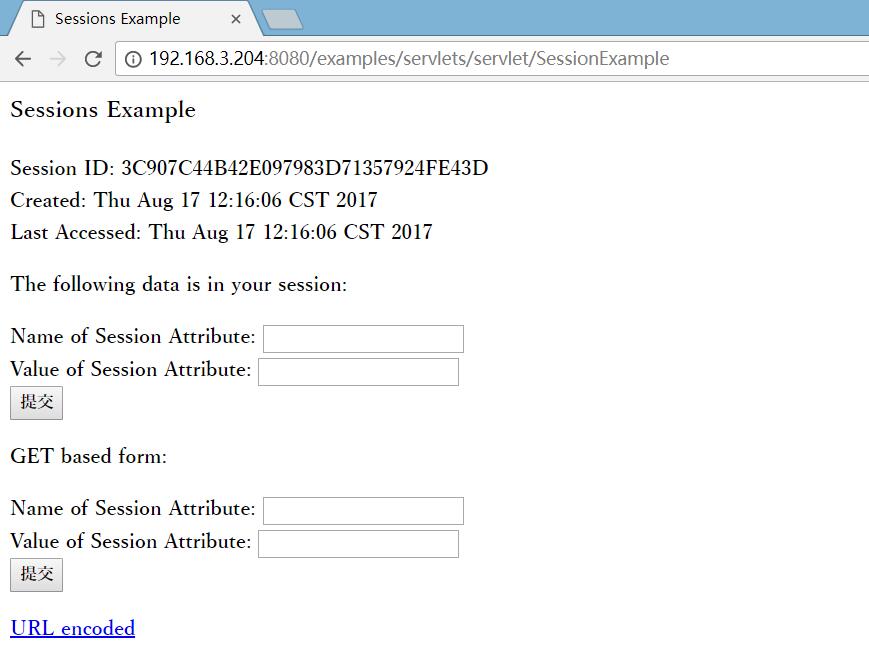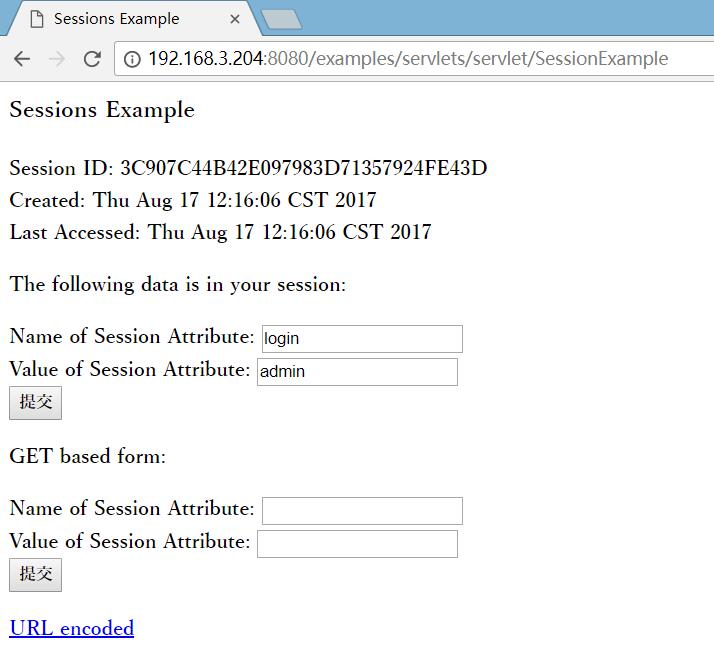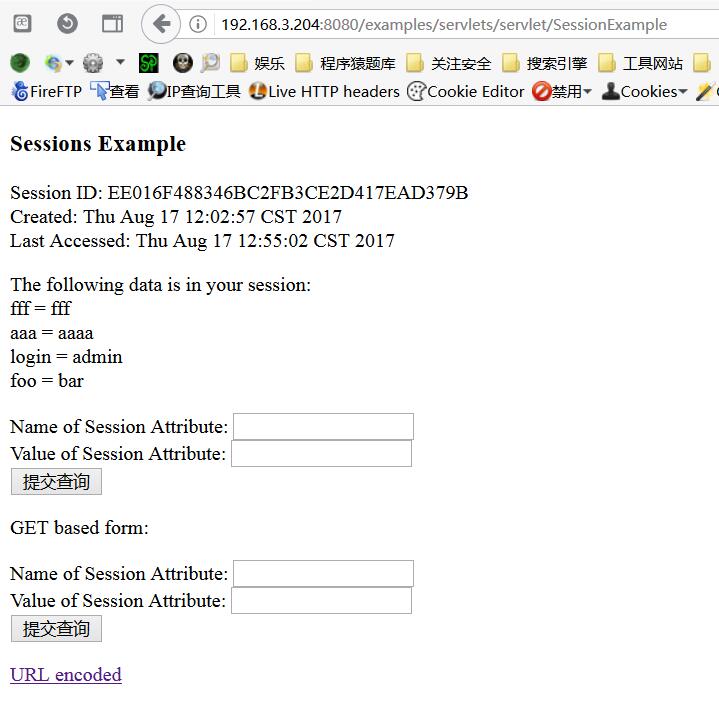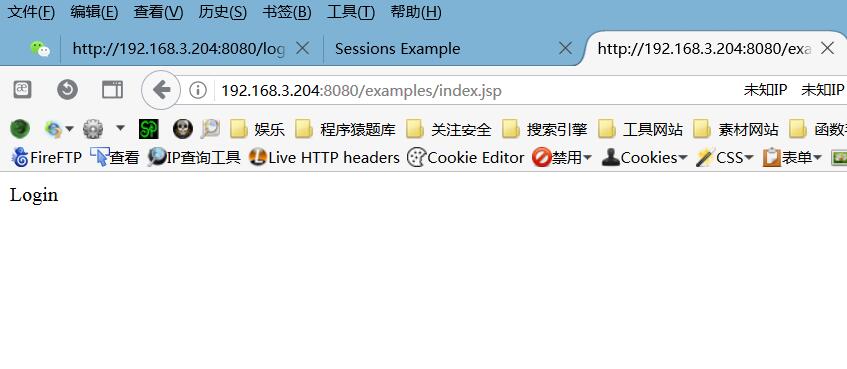渗透中tomcat Examples目录中关于Session的分析,如何越权
0x00 前言
昨晚安装了Tomcat,想总结一下关于JSP WEB部署方面的安全加固方案,于是搜索到了一个关于tomcat服务安装时自带的一个Examples目录下的Session操作页面产生的安全隐患。
但是参考网上的文章,发现存在一定的鸡肋问题,在文末与大家一起探讨。
位于:examples/servlets/sessions.html
0x01 环境
- 服务器:Windows Server 2008 R2
- HTTP Server Version:Apache Tomcat/7.0.79
- 端口:8080
- IP Address :192.168.3.204

访问页面如上所示,我们获得了一个Session ID,这个Session ID是代表了我们当前的一个身份会话。
0x02 关于Session
我们按照网上的参考文章新建几个文件:
2017/08/17 10:24 201 index.jsp#登录后的页面,如果没有管理员Session,则会跳转到login.jsp
2017/08/17 10:55 274 login.jsp#登录表单页面
2017/08/17 10:25 438 login2.jsp#处理登录页面
index.jsp code:
<%
if(session.getAttribute("login")
!= null && ((String)session.getAttribute("login")).equals("admin"))
{
out.println("Login");
}else{
response.sendRedirect("login.jsp");
}
%>
login.jsp code:
<html>
<head>
<meta charset="UTF-8">
</head>
<body>
<form action="login2.jsp" method="POST" >
username:<input type="text" name="username"><br>
password:<input type="text" name="password"
><br>
<input type="submit" value="login"><br>
<form>
</body>
</html>
login2.jsp code:
<%
if
(request.getParameter("username") != null && request.getParameter("password") != null) {
String username = request.getParameter("username");
String password = request.getParameter("password");
//验证身份
if (username.equals("admin") && password.equals("admin")) {
session.setAttribute("login","admin");
response.sendRedirect("index.jsp");
}
else {
response.sendRedirect("login.jsp");
}
}
%>
以上文件位于站点根目录(Webapps)下的login文件夹。
我们通过Examples下的Session操作页面来设置一个Session内容,Name为login,Value为admin。

Session ID: 3C907C44B42E097983D71357924FE43D
Created: Thu Aug 17 12:16:06 CST 2017
Last Accessed: Thu Aug 17 12:37:00 CST 2017
The following data is in your session:
login = admin
GET /login/login.jsp HTTP/1.1
Host: 192.168.3.204:8080
User-Agent: Mozilla/5.0 (Windows NT 6.3; WOW64; rv:54.0) Gecko/20100101 Firefox/54.0 FirePHP/0.7.4
Accept: text/html,application/xhtml+xml,application/xml;q=0.9,*/*;q=0.8
Accept-Language: zh-CN,zh;q=0.8,en-US;q=0.5,en;q=0.3
Accept-Encoding: gzip, deflate
Cookie: JSESSIONID=3C907C44B42E097983D71357924FE43D
x-insight: activate
Connection: keep-alive
Upgrade-Insecure-Requests: 1
设置成功后,我们直接访问login下的index.jsp文件,得到响应头如下:
HTTP/1.1 302 Found
Server: Apache-Coyote/1.1
Location: login.jsp
Content-Type: text/html;charset=ISO-8859-1
Content-Length: 0
Date: Thu, 17 Aug 2017 04:42:14 GMT
可以看到并没有利用成功,那么是什么原因呢?
我们看看向Session中设置令牌的页面响应头:
HTTP/1.1 200 OK
Server: Apache-Coyote/1.1
Set-Cookie: JSESSIONID=DF6A3AFB904871AC3F636C16B87B6364; Path=/examples
Content-Type: text/html;charset=ISO-8859-1
Content-Length: 1131
Date: Thu, 17 Aug 2017 04:47:54 GMT
可以发现当前这个响应给Session ID设置了一个有效路径。
我们获取到的Session是一个位于Examples文件夹的有效令牌,当我们用/examples目录下的令牌访问/login是无效的。
我们来看看设置Session的页面源代码:
import java.io.*;
import java.util.*;
import javax.servlet.*;
import javax.servlet.http.*;
public class SessionExample extends HttpServlet {
public void doGet(HttpServletRequest request, HttpServletResponse response)
throws IOException, ServletException
{
response.setContentType("text/html");
PrintWriter out = response.getWriter();
HttpSession session = request.getSession(true); // 如果获取不到 Session 就创建一个 Session
// print session info
Date created = new Date(session.getCreationTime());
Date accessed = new Date(session.getLastAccessedTime());
out.println("ID " + session.getId());
out.println("Created: " + created);
out.println("Last Accessed: " + accessed);
// set session info if needed
String dataName = request.getParameter("dataName");
if (dataName != null && dataName.length() > 0) {
String dataValue = request.getParameter("dataValue");
session.setAttribute(dataName, dataValue);
}
// print session contents
Enumeration e = session.getAttributeNames();
while (e.hasMoreElements()) {
String name = (String)e.nextElement();
String value = session.getAttribute(name).toString();
out.println(name + " = " + value);
}
}
}
关于request.getSession(true)官方好像没有对Session有效路径做介绍,参考的文章中大多都说 Session是全局有效的。
但是在Cookie中是对路径也有限制的。
0x03 成功的一次
这一次是成功了,但是项目必须部署在Examples目录下,我将Login下的文件都放入此目录。

获得一个新的Session,并且设置login为admin。
直接访问http://192.168.3.204:8080/examples/index.jsp

可以看到已经进入我们想要的页面了。

并且Session ID相同。
0x04 总结
此篇文章涉及到了Session的特性,以及Cookie与Session ID的关系,另外还有一定的疑问存在,Examples目录下的Session是不是全局的?
此漏洞过于鸡肋,况且也不会有应用部署到这个演示文件夹下,权当安全研究 ~~
再有一个问题就是,我们不知道Session中的Name和Value到底设置成什么才可以伪造其他身份,这些都是开发人员的习惯和标准,又增大了一个利用难度,所以说:鸡肋!鸡肋!鸡肋!
后文继续总结Tomcat的其他安全隐患……
